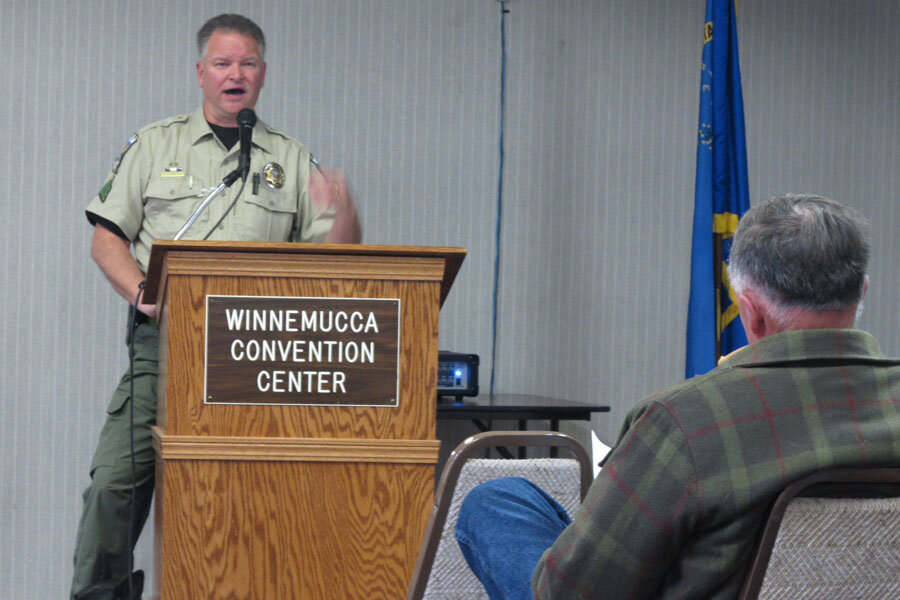I-80 drug stops defended by Nevada sheriff
Loading...
| Winnemucca, Nevada
A rural Nevada sheriff is defending the practice of stopping suspected drug traffickers on US Interstate 80 and confiscating tens of thousands of dollars even if no criminal charges are filed.
Reports that two men had filed lawsuits in federal court against the county stirred concerns among Humboldt County residents that deputies are making illegal searches and seizures along I-80 in the high desert near Winnemucca about 165 miles east of Reno.
Humboldt County Sheriff Ed Kilgore said he can't discuss case details, but he wants to assure residents the stops are legal and not intended to shake down unsuspecting visitors. He said that civil forfeitures are legal if an arresting officer suspects the individual obtained — or intends to use — the money illegally.
"What I'm hearing on the street is that we stop you and ask you for your license, registration and your insurance, and how much money do you have? That simply is not how it is ever done," he said at a sheriff's open house he hosted Tuesday night that attracted about 40 people to the Winnemucca Convention Center.
The federal plaintiffs from California and Colorado tell strikingly similar stories about their stops near Winnemucca in September and December. No drugs were found or arrests made, but both say they were told they'd be released with their vehicles only if they forfeited their cash in violation of their constitutional rights.
One gave up a briefcase filled with $50,000 cash, and the other handed over $13,800 and a handgun, their lawsuits contend.
"It's like Jesse James or Black Bart," John Ohlson, a Reno lawyer representing one of the men, told The Associated Press last week.
Bob Pace was among the locals who raised concerns that regardless of whether the claims are true, they may be giving the town a black eye.
"The majority of the community is extra concerned," said Pace, who taught school for 30 years and now works in the mining industry.
"You have a huge job and do it well," he told Kilgore. "But the perception is an individual on the road is stopped, and they are not cited. They are not arrested, but their cash or their weapons are confiscated."
Humboldt County District Attorney Michael Macdonald said that in cases of civil forfeitures, individuals have the right to go to court to try to prove they obtained the money is legally, rightfully theirs.
But Dan Deveny said that turns the justice system "upside down.'
"There's no citation," he said. "But now you are guilty until you prove yourself innocent."
Kilgore acknowledged drug-interdiction tactics are a "hot topic," but he said they follow the same guidelines used along major interstate corridors throughout the West, as well as on the East Coast.
Sgt. Chris Aker, who explained some of the tactics with his K-9 "Boots" at his feet, said officers are trained to recognize evasiveness during questioning, including stories about travel routes that don't add up or a lack of luggage on cross-country trips.
"We don't just say how much money have you got, we're going to take it," he said, adding that he often suspects criminal activity but doesn't have enough evidence to form a "reasonable suspicion'" to seize property.
"There's been a lot of them where I think this is dirty and it doesn't make sense — but I have to let them go," he said.
Aker emphasized the US Drug Enforcement Administration two years ago identified Salt Lake City as a drug hub for Mexican cartels shuttling money and drugs between there and California.
"We're trying to combat crime in our own little way in the war on drugs," he said. "We're not just talking about people driving to buy medical marijuana. These are drug traffickers with guns who may be staying in our hotels."
Robert Dolan, an ex-Humboldt County public defender now with a private practice in Winnemucca, said he's a civil libertarian who thinks the laws should be changed but that currently "you don't need a criminal prosecution to be part of a civil forfeiture."
"It's a slippery slope of evidentiary standards ... but it's out there. It's lawful," Dolan said. "The deck is stacked against the citizens. And I'm not happy about it. But this system was not invented by Sheriff Kilgore."







